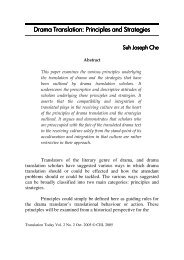Re-Evaluation of Lin Shu (the Chinese Translator) - National ...
Re-Evaluation of Lin Shu (the Chinese Translator) - National ...
Re-Evaluation of Lin Shu (the Chinese Translator) - National ...
You also want an ePaper? Increase the reach of your titles
YUMPU automatically turns print PDFs into web optimized ePapers that Google loves.
154 <strong>Re</strong>-<strong>Evaluation</strong> <strong>of</strong> <strong>Lin</strong> <strong>Shu</strong> (<strong>the</strong> <strong>Chinese</strong> <strong>Translator</strong>):A Systemic Approach to Literary Translationperiod, <strong>the</strong> focus <strong>of</strong> translation in China shifted from sciencetranslation to fictional translation owing to <strong>the</strong> social function <strong>of</strong>fiction.Ideology and <strong>Lin</strong> <strong>Shu</strong>'s TranslationsIdeology prevalent at <strong>the</strong> turn <strong>of</strong> <strong>the</strong> twentieth century, to alarge extent, influences <strong>Lin</strong> <strong>Shu</strong>’s choice <strong>of</strong> text for translation aswell as <strong>the</strong> translating method adopted by <strong>Lin</strong> <strong>Shu</strong>. Fur<strong>the</strong>rmore,traditional <strong>Chinese</strong> ideology also has an impact on <strong>Lin</strong> <strong>Shu</strong>’smanipulation on <strong>the</strong> original.A. Ideology and <strong>Lin</strong> <strong>Shu</strong>’s Choice <strong>of</strong> Text for TranslationIdeology plays a part in <strong>the</strong> decision-making and behavior <strong>of</strong>an individual or a group. The mainstream ideology in early modernChina greatly influenced translators in that period, first in what totranslate. This part mainly investigates <strong>the</strong> effect <strong>of</strong> ideology ontranslators’ choice <strong>of</strong> text for translation.It’s well acknowledged that translation career in earlymodern China (about 1930) started with translation <strong>of</strong> Westernscience and technology as a by-product <strong>of</strong> WesternizationMovement. Round about <strong>the</strong> Hundred Day’s <strong>Re</strong>form, reformists castmuch attention on translation <strong>of</strong> Western thinking and literature. Inaccompany with political reform, <strong>the</strong>y launched “Literary<strong>Re</strong>volution”, among which “Fictional <strong>Re</strong>volution” played <strong>the</strong> majorpart. Fiction was chosen to be a tool <strong>of</strong> social reform for its socialfunction instead <strong>of</strong> its literary or aes<strong>the</strong>tic values. Fictionaltranslation was first seen as a tool to arouse <strong>the</strong> populace’spatriotism and to enlighten <strong>the</strong> masses.<strong>Lin</strong> <strong>Shu</strong>’s whole life was spent in a society with weaknational strength. <strong>Re</strong>forms and enlightenment are <strong>the</strong> mainstream
















